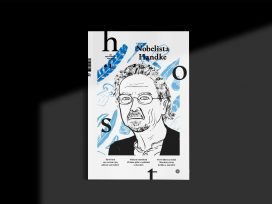Abstracts for Host 10/2006
Pavel Ondracka
The myth of Jiri Kubena (Jiri Kubena: Memory of a poet. From my horologe)
For his 70th birthday, poet Jiri Kubena has presented the book Memory of a poet. Its complicated composition, and its title, suggest that this seemingly fluent text covering more than 400 pages had an intricate origin and is provided with complex architecture and multiple meanings. And that regardless of the stream of refined vocabulary and sometimes overloaded structure, more than one thing remains untold. In the preface, the author confirms that autobiography, as far as the genre is concerned, is a poetic hybrid positioned halfway between personal recollections, which can be written by anybody, and memoirs, in which a publicly engaged and important personality interprets, from his/her point of view, the events of his/her life in as broad a context as possible.
Eliska F. Jurikova
An evocative master of the short story, or For God’s sake, I wouldn’t like to be in your shoes, sir (Jan Balaban: We are here)
Whenever confronted with Jan Balaban’s prose, I experience two competing feelings. On the one hand, I cannot but formulate my reverence for a writer who is able to reify his thoughts (i.e. masterfully) with words, express his inner cosmos. On the other hand, I feel discomfited by the fact that this evocatively created system of essential disillusions and uncertainties “is not my cup of tea”, i.e. it captures my attention, but doesn’t enchant me. I am intensively aware of the fact that I am not able to share the author’s attitudes and emotions, I can only observe them – keeping my distance like a biologist attracted by peculiar forms of human existence.
Translator in the shadow (Marianna Taymanova about her Russian translation of Milan Kundera’s Testaments betrayed)
Milan Kundera enjoys enormous popularity and respect in Russia, a fact that is proved by his books’ high print runs. In 2004, the St. Petersburg-based publishing house Azbuka published a translation of his philosophic essays Testaments betrayed (Narushennye zaveshcheniya) as a part of a large project including the publication of his entire works from the Czech and the French periods. Kundera himself has said he cares a lot about his reception by readers’ in Russia, which was reflected in his translation requirements. The translation was carried out by Marianna Taymanova, famous translator from French into Russian. The story of her work might be interesting to Czech readers as well because it proves how demanding the author is about translations, and also illustrates his idea on translation in general.
Published 3 January 2007
Original in Czech
Contributed by Host © Host Eurozine
PDF/PRINTNewsletter
Subscribe to know what’s worth thinking about.



